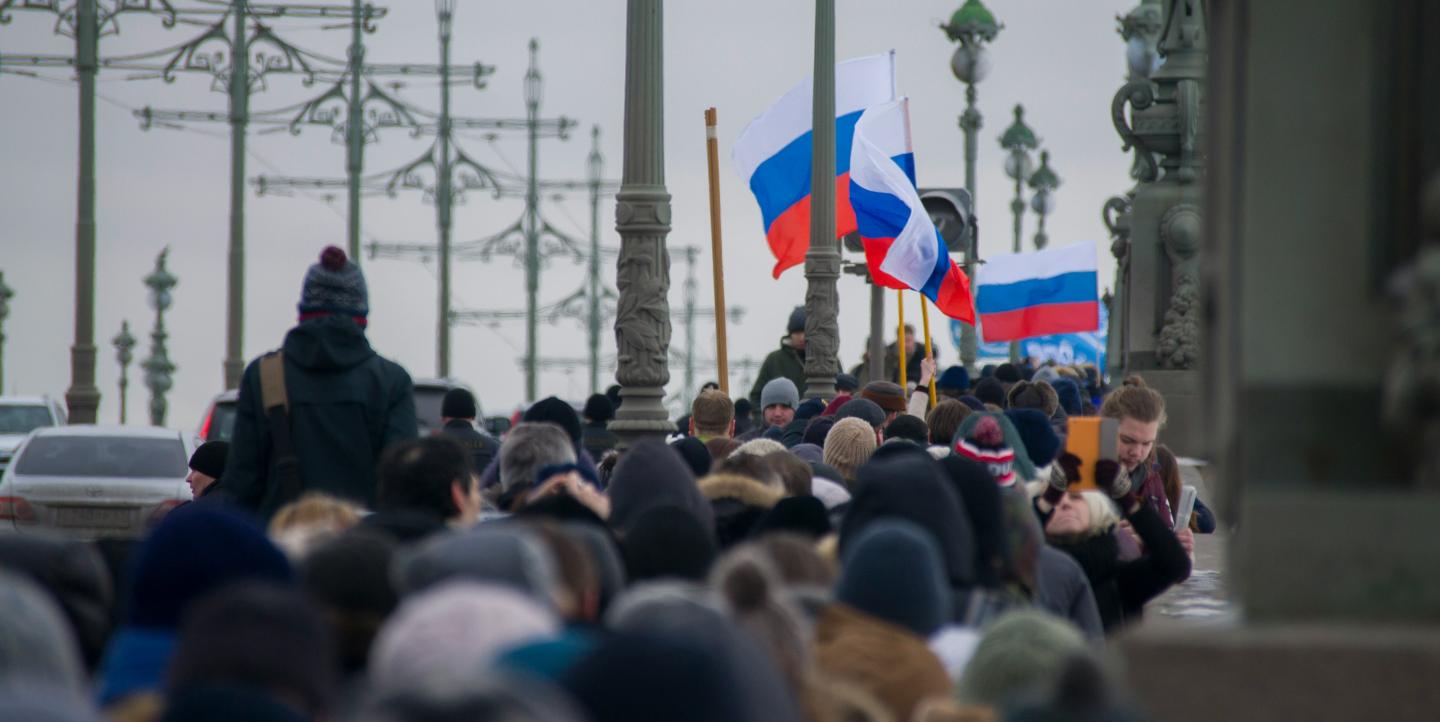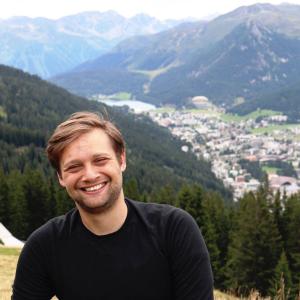تبدو إمكانية تحقيق الديمقراطية في روسيا بعيدة المنال في ظل استمرار الرئيس فلاديمير بوتين في ترسيخ حكمه الاستبدادي.
ومع استمرار حرب روسيا على أوكرانيا، يواصل نظام الرئيس فلاديمير بوتين قمع المعارضة السياسية والمدنية، وحظر وسائل الإعلام المستقلة، إضافة إلى تكثيف ضخ الدعاية القومية والعسكرية في المجتمع.
وبالتالي، أصبح الصحفيون يواجهون تهديدات مستمرة بالسجن أو الموت بسبب عملهم، وقد نما شعور الخوف لديهم منذ وفاة الناشط المناهض للفساد أليكسي نافالني في وقت سابق من هذا العام، إضافة إلى فوز بوتين في الانتخابات الرئاسية لعام 2024، والتي لم يُسمح فيها لأي مرشح معارض بالمشاركة.
من جانبها، قالت إيكاترينا مارتينوفا، الناشرة في منصة DOXA للصحافة الشبابية الروسية في المنفى: "عندما تفكر للحظات في وفاة نافالني، تدرك تمامًا مدى ضعفك أمام النظام"، مضيفةً: "إذا كانوا قادرين على قتله، فماذا سيحدث مع الآخرين؟".
ومع استمرار انحدار روسيا نحو الاستبداد، يواجه الصحفيون صعوبة في تحديد الدور الذي يمكن أن تلعبه وسائل الإعلام المستقلة في تعزيز مستقبل ديمقراطي للبلاد.
لمعرفة المزيد عن هذا الموضوع، أجريت مقابلات مع صحفيين روس يعملون في المنفى على وضع دعائم لمستقبل ديمقراطي لروسيا وذلك على الرغم من كل الصعوبات التي تواجههم.
ومن خلال إشراك الشباب، وبناء جيل جديد من الصحفيين المؤيدين للديمقراطية، وإعادة دمج الأقليات العرقية، والسكان الأصليين في النقاشات حول مستقبل روسيا، و"حفظ التاريخ" للأجيال القادمة، فإنهم يُظهرون كيف يمكن للصحافة أن يكون لها تأثير كبير حتى في أكثر المجتمعات استبدادًا.
الوصول إلى الشباب
وفي مواجهة الكم الهائل من الدعاية الحكومية التي تستهدف الشباب، أصبحت المنصات المستقلة التي يُمكنها إشراك الشباب الروس بتقارير موثوقة لا تقدر بثمن.
وقد بدأت DOXA، وهي منصة صحفية شبابية تعمل في المنفى، كمجلة يديرها الطلاب وتغطي قضايا الحرم الجامعي في المدرسة العليا للاقتصاد في موسكو، وقد وجدت نفسها في موقع فريد للقيام بهذا الدور، فتقارير المنصة التي ينفذها الشباب الروس تقدم معلومات لزملائهم الشباب في البلاد عن أشكال الدعاية وذلك بدءًا من "قصص Z المصورة" المؤيدة للحرب وصولاً إلى تضمين الدعاية في الاختبارات القياسية - وذلك في بيئة معلوماتية تشهد تزايدًا في النزعة القومية.
واستطردت مارتينوفا، قائلةً: "عندما نقوم بتغطية الدعاية، ونوضح لجمهورنا حقيقة ما يحدث، وطبيعة الاتجاه الذي يسيرون فيه، يصبح لديهم فهم أوضح للصورة الكاملة، وما يفعلونه بهذه المعلومات، وماذا ستكون عليه ردود أفعالهم، وما سيفعله مجتمعهم".
ولم تكن منصة دوكسا غريبة على الاضطهاد من قبل الكرملين، فقد استهدفها النظام منذ تغطيتها الصحفية للمظاهرات الحاشدة ضد استبعاد المرشحين المستقلين خلال انتخابات مجلس الدوما في موسكو عام 2019، وفي عام 2022، حُكم على أربعة من محرريها المؤسسين بالعمل الإصلاحي وذلك على خلفية نشر المنصة لمقطع فيديو عن سجن نافالني، وفي العام نفسه، تم حظر دوكسا في روسيا مما أجبر فريقها على المنفى.
وأشارت مارتينوفا إلى أنه "على الرغم من محاولات الرقابة، تضاعف قراء المنصة مع بداية الغزو الروسي الكامل لأوكرانيا"، قائلةً: "لقد نمت منصتنا خمس أو ست مرات في تلك اللحظة (منذ بداية الغزو)، وأصبح حسابنا على منصة إنستجرام محورًا رئيسيًا لتقديم المعلومات وتغطية الغزو بشكل كامل"، وأضافت: "لم نعمل كأننا طلاب فحسب، بل وضعنا أنفسنا كوسيلة إعلامية تستهدف الشباب".
وبينما تواصل منصة DOXA دورها في تفجير فقاعات الدعاية، فإنها تعمل أيضًا على إعداد جيل جديد من الصحفيين المؤيدين للديمقراطية، حيث تعمل المنصة على توجيه الصحفيين في بداية حياتهم المهنية، وتساعدهم على نشر أعمالهم، كما تدعمهم في العثور على المنح الدراسية والتأشيرات المطلوبة لتمكينهم من السفر إلى أوروبا.
وحذرت مارتينوفا قائلةً: "إذا لم يكن لهؤلاء الصحفيون الشباب مكان عمل مناسب، فسوف يذهبون للعمل لصالح الدعاية الحكومية، أو سيتوقفون عن العمل في مجال الصحافة".
وشددت مارتينوفا على أنه نظرًا لتدهور الحريات في روسيا، فيجب أن يتم تدريب هؤلاء الصحفيين على المدى الطويل.
كما ذكرت مارتينوفا: "لا يمكننا تعليم الجيل الجديد من الصحفيين في غضون شهر أو شهرين فقط"، مشيرة إلى "أهمية أن يكون هذا العمل مستمرًا على مر السنين، وذلك من أجل ترسيخ دعائم المستقبل الديمقراطي لروسيا".
مركزية الحركات الديمقراطية للسكان الأصليين
وفي يناير/كانون الثاني 2024، اندلعت احتجاجات جماهيرية واسعة في جمهورية باشكورتوستان ذات الأغلبية التركية، وهي الواقعة شمال كازاخستان بين نهر الفولجا وجبال الأورال، وذلك بعد اعتقال زعيم حركة حقوق البيئة والسكان الأصليين، وقد شكلت هذه المظاهرات إحدى أكبر موجات المعارضة ضد الكرملين خلال حربه على أوكرانيا.
ووفقًا لما كتبته ليلى لاتيبوفا، الصحفية التترية وابنه جمهورية باشكورستان، فإن "أنجح الحركات الثورية السلمية في محيط روسيا كانت قائمة على التعبئة الشعبية الذاتية"، مشيرة إلى أنه "توجد على الأقل حركة واحدة كهذه في روسيا اليوم، ليست في موسكو فقط، بل أيضًا في باشكورستان ذات الغالبية التركية".
ولاتيبوفا، هي المراسلة الخاصة السابقة لصحيفة موسكو تايمز، وتركز في تقاريرها على قضايا الروس الأصليين، وغير العرقيين- مثل التتار، والبشكيريين، وسكان سيبيريا الأصليين، وغيرهم - وهم فئات غالبًا ما يتم استبعادهم من النقاشات المتعلقة بمستقبل روسيا.
وقد سلّطت لاتيبوفا الضوء في تقاريرها أيضًا على المحاولات السابقة لتحقيق الديمقراطية الإقليمية، وعلى النشاط الحقوقي للسكان الأصليين وخصوصًا في ظل قمع الكرملين اليوم، وكيف يُمكن للجهات الفاعلة الدولية دعم حقوق السكان الأصليين، وتعزيز الديمقراطية المحلية في المستقبل.
ووفقًا لما أكدته لاتيبوفا فإنّ "الهدف الرئيسي يكمن في "سد الفجوة المعلوماتية" بين جمهوريات روسيا وسكانها الأصليين، خاصة بالنسبة للصحفيين والسياسيين والناشطين الدوليين، ومن خلال زيادة الوعي بما يحدث في الجمهوريات للجمهور غير الروسي، تسعى لاتيبوفا إلى دفع الفاعلين الدوليين للنظر في روسيا أكثر شمولية في حال حدوث تحول ديمقراطي.
ولفتت لاتيبوفا إلى "الفضول بين الساسة الغربيين لمحاولة فهم ما يحدث في هذه الجمهوريات"، مشيرة إلى النشاط الذي يقوم به الروس غير العرقيين خارج المدن الكبرى مثل موسكو وسانت بطرسبرغ، وأضافت: "لقد فعل الناس في باشكورتوستان ما كان الجميع يتوقعونه من سكان موسكو، ولم يحدث هذا من فراغ، بل إنها عملية طويلة لتطوير المجتمع المدني والتي تم تجاهلها ببساطة وعدم تغطيتها بشكل كاف".
كما ذكرت لاتيبوفا أنّ هذا الحوار يجب أن يحدث الآن، حيث يتخيل الناشطون والصحفيون ما قد يكون عليه المستقبل بعد عهد بوتين، وقالت: "عندما نتحدث عن روسيا الديمقراطية، يتعين علينا أن نفكر فيما سيكون عليه مستقبل روسيا، وعلينا أن نتحدث عن حقوق السكان الأصليين، إنه موضوع غير مريح، لكن يجب أن يتم طرح هذا الموضوع".
"حفظ التاريخ"
تسعى منصة التحقيقات الصحفية الروسية iStories إلى "حفظ التاريخ" من خلال تقاريرها.
وقام الصحفي رومان أنين، الحاصل على جائزة نايت للصحافة الدولية الصادرة عن المركز الدولي للصحفيين لعام 2020، بتأسيس iStories، وتتناول المنصة عدة قضايا، مثل كيفية استغلال روسيا لوكالة الرقابة، روسكومنادزور، لاستهداف منتقدي نظام بوتين، وكيف تقوم العائلات الروسية، بما في ذلك السياسيون، بتبني الأطفال الأوكرانيين المختطفين.
من جهته، قال أنين: "يواصل مراسلونا التحقيق في الفظائع المروعة التي ارتكبها الجيش الروسي في أوكرانيا، أو الجرائم الوحشية التي ارتكبها نظام بوتين ضد شعبه وضد الروس"، مضيفًا: "هذا ما أسميه حفظ التاريخ".
وبينما يُكرم الكرملين مجرمي الحرب في بوتشا، وينشر معلومات مُضللة حول الهجمات التي قتلت أطفالاً في أوكرانيا، بل ويعيد كتابة تاريخ الجرائم التي ارتكبت في الحقبة السوفيتية، فإنّ إنشاء سجل لما يحدث بالفعل في روسيا والأراضي المحتلة في أوكرانيا ضرورة لا غنى عنها لمواجهة الروايات الصادرة عن الكرملين، وأوضح أنين: "إن الأمر يتعلق بإثبات [الحقائق] وتحقيق العدالة للضحايا، بما في ذلك الجرائم المروعة"، مُضيفًا: "هذا هو التأثير الأعظم الذي يمكننا التفكير فيه".
ويعتقد أنين أنّ تقارير iStories يمكن أن تساعد في وضع الأساس للجهود المستقبلية لمحاسبة المسؤولين عن الجرائم. وبالفعل، فقد استندت حكومة المملكة المتحدة إلى التحقيقات التي أجرتها المنصة لدعم العقوبات التي فرضتها على روسيا.
بالإضافة إلى ذلك، يمكن أن تُسهم هذه التقارير في توعية الأجيال القادمة بالجرائم التي ارتُكبت في أوكرانيا والأراضي المحتلة، وقال أنين: "إن مسؤولية الصحفيين هي توثيق هذا التاريخ حتى تتمكن الأجيال القادمة من معرفة ما حدث بالفعل في روسيا"، وأضاف: "على الأقل، ستتمكن الأجيال القادمة من فهم ما جرى، وتحاول تفادي هذه الأخطاء".
وفي مواجهة الاستبداد الواسع اليوم، يتمسك هؤلاء الصحفيون بالأمل في مستقبل ديمقراطي لروسيا، ويطمحون في أن يساعد الأساس الذي يضعونه اليوم في إعداد جيل جديد من النشطاء، والسياسيين المؤيدين للديمقراطية، والصحفيين.
وذكر أنين: "أعتقد أن هناك احتمالية لوجود مستقبل ديمقراطي لروسيا، لأنني أعلم أن هناك عشرات الملايين من الروس الذين يدينون الحرب".
واختتم حديثه قائلاً: "إنّ قواتنا محدودة، ولكن من خلال ما نقوم به، فإننا نزيد من احتمالية وجود مستقبل ديمقراطي لروسيا ليكون فوق الصفر".
الصورة حاصلة على رخصة المشاع الإبداعي على Unsplash بواسطة كلاوس رايت.


